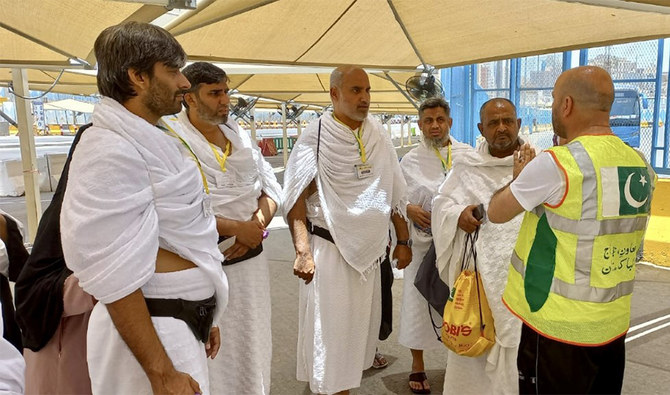ISLAMABAD: Federal Minister for Religious Affairs Senator Talha Mahmood said on Tuesday Hajj had become cheaper for Pakistani pilgrims in dollar terms compared to last year while expressing hope the government would receive “extraordinary facilities” and cooperation from the Saudi authorities during the annual pilgrimage.
The Hajj is an obligatory religious ritual for adult Muslims who are physically and financially capable of carrying it out. It involves visiting the holy cities of Makkah and Madinah at least once in a lifetime and takes place during the last month of the lunar Islamic calendar called Dhu Al-Hijjah.
Saudi Arabia reinstated Pakistan’s pre-pandemic Hajj quota of 179,210 pilgrims and scrapped the upper age limit of 65 in January. About 80,000 Pakistani pilgrims are expected to perform the pilgrimage under the government scheme this year, and the rest will be facilitated by private tour operators.
Pakistan started the Hajj flight operation to Saudi Arabia from different cities, including Karachi, Lahore, and Faisalabad, on Sunday, and it is expected to continue until June 21.
“In terms of dollars, the Hajj cost $5,000 last year, and it is $3,800 this year,” he told Arab News in an exclusive interview on Tuesday night. “Hajj is cheaper compared to the previous year, but the Pakistani rupee has devalued, and the dollar has appreciated.”

A Pakistani hajj volunteer speaks to pilgrims at Makkah, Saudi Arabia on June 16, 2022. (Courtesy: Pakistani Hajj mission in Jeddah/File)
The minister said his team had already returned Rs55,000 to each pilgrim and was looking for ways to bring the overall Hajj cost further down.
He thanked King Salman bin Abdulaziz Al-Saud and Crown Prince Mohammed Bin Salman for their generosity toward the people of Pakistan, saying: “They always stand by us in difficult times. They accommodate us in different things with respect to Hajj. This is a full swing Hajj after four years. I believe they will provide us with extraordinary facilities.”
Pakistan introduced a Hajj sponsorship scheme this year, allowing its overseas nationals to apply for pilgrimage in United States dollars or sponsor close relatives in the country. However, it received a lackluster response, with only 7,000 applications against an allocated quota of 44,000.
“Everything is made complicated in our country while the need is to simplify the system,” the minister said, blaming certain flaws in the scheme for its failure. “People were facing difficulties in getting their passports and remit dollars.”
In the wake of the dollar shortage in the country, the government returned a Hajj quota of nearly 8,000 to the Saudi authorities but later managed to get some 1,500 back to accommodate domestic applicants.
“We had returned the quota of around 8,000 because the Ministry of Finance had to release $24 million, and it was not ready to give [the amount],” he informed.
Asked about the Makkah Route Initiative, a component of Saudi Arabia’s Guests of God Service Program inaugurated in 2019 under Vision 2030 to diversify the kingdom’s economy, Mahmood said there was no hurdle in expanding it beyond Islamabad, but the issue was not taken up with the Saudi authorities before the Hajj flight operation.
Under the scheme, Hajj pilgrims go through immigration facilities at the airports of their respective countries, making it possible for them to enter the kingdom without repeating the same procedure upon arriving in Saudi Arabia.
“There was a need to work on it before the Hajj,” said the minister. “Unfortunately, it was not done.”
However, he vowed to expand the initiative to Lahore and Karachi airports in the coming year to facilitate the maximum number of pilgrims with the innovative immigration process.
Asked about regulating private Hajj operators who enjoy half of the pilgrims’ quota, he promised to initiate action against them in case of any complaints.
“We will see on merit after Hajj... if we get complaints from pilgrims, what action we can initiate against [these firms],” Mahmood said. “If we get something serious during the Hajj, we will initiate action.”
However, he pointed out that the government would require “genuine information with proof” to justify the action.
Regarding day-to-day issues and complaints of pilgrims before their departure from Pakistan, he said the government was receiving complaints about the biometric data of elderly people, along with delays in visa processing, vaccination, and flight delays. He added they were swiftly trying to address these challenges.
“It is difficult to keep one hundred percent of people complaint-free,” he continued. “Our job is to keep the maximum number of people in a better situation.”












